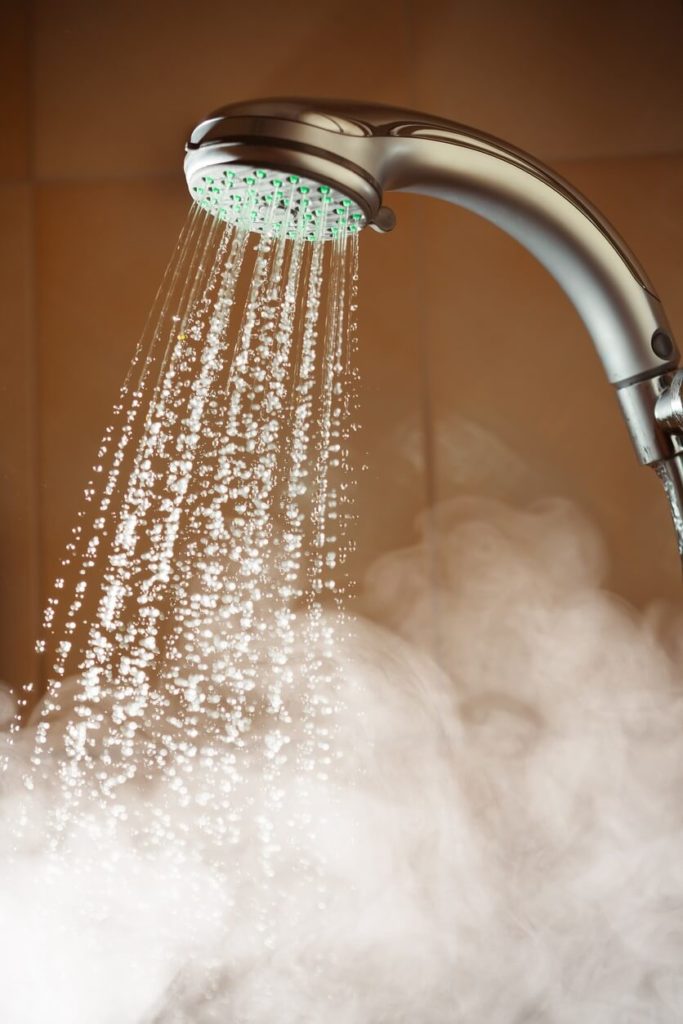Hot Bath: Grandma’s Cure for Anxiety?
Written by: Loris Vitry (holistic coach)
Validated by: Cathy Maillot (Osteopath)
Caution: If you have any medical questions or concerns, please speak to your doctor. Even if the articles on this site are based on scientific studies, they do not replace professional medical advice, diagnosis or treatment.

The fast pace of everyday life can sometimes give way to a feeling of anxiety.
In order not to let “bad stress” set in, it’s important to take care not only of your body, but also of your mind.
There are plenty of natural remedies for anxiety, but have you ever tried hot baths?
Combined with certain natural elements (especially plants), a hot bath becomes one of the best natural remedies for stress.
This article shows you some hot baths to take to relieve anxiety.
The hot lavender bath
One of the most effective hot bath solutions for anxiety is to spruce up your bath with lavender leaves.
You will enjoy a bath that is not only balancing but also relaxing.
This plant is also very fragrant, everything you need to eliminate negative tensions and forget about worries.
To benefit from the benefits of this powerful “emotional anti-inflammatory” in your bath, two possibilities are available to you.
As a first option, you will have to fill a muslin sachet, with lavender flowers and leaves to place at the bottom of your bathtub.
After that, cover the sachet with very hot water and let it steep for about ten minutes before adding the bath water.
The second way to proceed is to prepare a decoction of lavender flowers and let it steep.
After infusion, filter the resulting solution and finally add the water needed for your bath.
The hot lime blossom bath
Particularly appreciated for its benefits, lime has been used for a long time in various natural treatments.
Thanks to its calming capacities, this plant acts largely, in a positive way of course, on the nervous system.
In addition to providing a good quality of sleep, lime is able to calm restlessness and soften nervous palpitations.
Its natural properties also allow it to fight anxiety and / or stress.
In short, the lime tree remains an excellent ally against a whole host of disorders linked to excessive irritability.
To use it, just use a sachet of muslin, much like lavender.
Otherwise, you can switch to a simpler alternative.
All you have to do is prepare an infusion (well supported) of lime blossom and filter it.
After filtration, add this preparation (lukewarm) to your bath water.
The hot lemon balm or mint bath
Lemon balm is a plant well known for its particularly soothing action, especially when dried.
A simple bath with lemon balm will therefore provide you with a multitude of benefits.
Combined with mint, you will get a much more relaxing and refreshing bath.
Thanks to its antiseptic properties, the latter plant is also recognized for its ability to soothe redness or skin rashes linked to stress or nervousness.
To prepare this hot bath, put a quart of hot water on about six tablespoons of lemon balm or mint leaves.
Then wait about ten or fifteen minutes to get a fairly sustained infusion.
Now filter the resulting solution, and once warm, add your bath water to it.
The hot bath with essential oils
Just like plants, essential oils have more satisfying effects when they participate in the composition of your bath water.
Their particularity is noted mainly on two points: they are quickly absorbed by the skin and by the olfactory route.
You can still use lavender oil in your bath because it is just as effective as its fresh or dry leaves.
You can also turn to shell marjoram, the essential oil of which is unique.
Indeed, this plant cultivated as a plant still called garden marjoram has soothing and de-stressing properties.
Thus, the shell marjoram promotes sleep and improves the quality of sleep.
Its essential oil calms the nervous system and relieves certain chest or digestive pains linked to stress.
Therefore, the essential oil of garden marjoram is ideal for relaxing your muscles and softening your nervous system.
To use them, just add about fifteen drops of essential oil of lavender or shell marjoram to a neutral base.
Then add a hot bath and enjoy it for at least twenty minutes or so before resting.
Pay attention to how to use essential oils in the bath
Keep in mind that most essential oils should absolutely not be added directly (in their pure state) to bath water.
Just like regular oils, essential oils also don’t mix with water.
They are indeed likely to cause serious unpleasant burns on the skin.
Therefore, it is important to use a neutral base.
To dilute them correctly, you can get a neutral base in pharmacies, health food stores or drugstores.
An alternative is to mix essential oils with fresh whole milk or cream.
You can also do it with powdered milk mixed with hot water, diluted egg yolk, or neutral liquid soap.
The hot bath made from clay and algae
Thanks to its components, this bath will know how to eliminate negative tensions, stimulate blood circulation and get rid of excess pounds.
It will also save you from any digestive discomfort caused by anxiety.
To prepare it, you will only have to mix four tablespoons of green clay, four tablespoons of coarse sea salt and three tablespoons of seaweed powder.
Then add your bath water to the mixture of these three elements.
Take about twenty minutes to enjoy all the benefits of this stress-relieving bath as pleasant as it is relaxing.
The hot bath with Epsom salt
Epsom salt can also give you a soothing and stress relieving bath.
Affordable, you can easily get it in pharmacies and grocery stores.
Present in the bath, it helps reduce anxiety, but also relieves certain muscle pain.
To prepare an Epsom salt bath, just put a small amount of this salt in your hot bath.
Then enjoy this bath for about fifteen minutes.
However, this bath is prohibited for individuals with heart problems or hypertension and for the elderly or weak.
In summary, a hot bath is a great natural way to fight anxiety.
To enjoy all its benefits, you will only have to choose the one or those that suits you (enent) among those presented.
Continue reading:
Cuddle therapy: cuddling to reduce stress?

